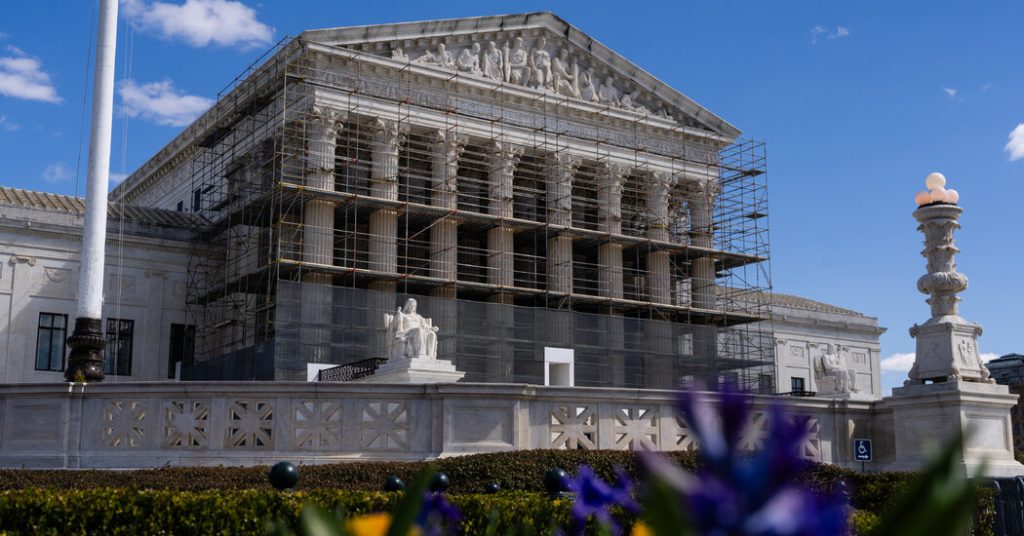The Supreme Court will hear arguments on Wednesday over the fate of the nation’s first religious charter school, in Oklahoma, which seeks to use government money to teach a curriculum infused by Catholic doctrine.
In earlier cases from Maine and Montana, the court ruled that states that decide to create programs to help parents pay for private schools must allow them to choose religious ones. The main question in the new case is whether the First Amendment permits — or even requires — states to sponsor and finance religious charter schools, which are public schools with substantial autonomy.
The Oklahoma school, St. Isidore of Seville Catholic Virtual School, is to be operated by the Archdiocese of Oklahoma City and the Diocese of Tulsa and aims to incorporate Catholic teachings into every aspect of its activities.
A ruling in favor of the school could affect laws in 45 other states that authorize charter schools. It would also blur a line established in earlier Supreme Court cases distinguishing between government money provided to parents to spend on private schools, including religious ones, and government support provided directly to religious schools.
The dispute is the third major case dealing with religion to be argued before the justices in the space of about a month. In March, the court seemed poised to rule that a Catholic charity in Wisconsin was entitled to a tax exemption that had been denied by a state court on the grounds that the charity’s activities were not primarily religious. Last week, the court signaled that it was likely to rule that parents with religious objections may withdraw their children from classes in which storybooks with L.G.B.T.Q. themes are discussed.
After Oklahoma’s charter school board approved the proposal to open St. Isidore, the state’s attorney general, Gentner Drummond, a Republican, sued to stop it. Mr. Drummond said a religious public school would violate the First Amendment’s prohibition of government establishment of religion and the State Constitution’s ban on spending public money to support religious institutions.
He said the school crossed a line drawn by Chief Justice William H. Rehnquist in a 2002 Supreme Court decision that distinguished “between government programs that provide aid directly to religious schools” as opposed to “programs of true private choice, in which government aid reaches religious schools only as a result of the genuine and independent choices of private individuals.”
Lawyers for St. Isidore countered in a court filing that it “hopes to offer another educational option for Oklahomans, and no student will be compelled to attend St. Isidore.” They added that “the school will receive students, and state funding, only through the private choices of families.”
The school said it would welcome students of “different faiths or no faith.” It was less categorical about teachers, saying that all Oklahoma charter schools are free to adopt their own personnel policies.
The state’s Supreme Court ruled against the school, with the majority saying it would “create a slippery slope” that could lead to “the destruction of Oklahomans’ freedom to practice religion without fear of governmental intervention.”
“St. Isidore is a public charter school,” the majority said, noting that the state law allowing such schools requires them to be nonsectarian. “Under both state and federal law,” the majority ruled, “the state is not authorized to establish or fund St. Isidore.”
In the most recent decision from the U.S. Supreme Court about government support for religious schools, Carson v. Makin in 2022, the majority ruled that Maine could not exclude religious schools from a state tuition program.
But Chief Justice John G. Roberts Jr., writing for the majority, said that “Maine may provide a strictly secular education in its public schools.”
In dissent, Justice Stephen G. Breyer, who retired that year, said that even Maine’s program, limited to private schools, was problematic.
“Members of minority religions, with too few adherents to establish schools, may see injustice in the fact that only those belonging to more popular religions can use state money for religious education,” Justice Breyer wrote. “Taxpayers may be upset at having to finance the propagation of religious beliefs that they do not share and with which they disagree.”
Justice Amy Coney Barrett recused herself from the Oklahoma case, Oklahoma Statewide Charter School Board v. Drummond, No. 24-394, but has not said why. She was a law professor at Notre Dame, whose religious liberty clinic represents the charter school, and is close friends with Nicole Garnett, a professor there who has assisted St. Isidore.


